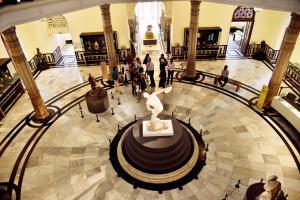Hit by nearly eight months of closure, the citys museums, our sanctuaries of culture and heritage, must wait longer to reopen

The Chhatrapati Shivaji Maharaj Vastu Sangrahalaya has been shut since March this year. File pic/Pradeep Dhivar
It was around the early days of the lockdown. I was deep into working on a report about the measures that our city's museums and art galleries were taking to ensure their exhibits and artworks remained in mint condition while they were shut for visitors. Most museum curators and owners of art galleries had created systems that enabled their staff to access the premises for maintenance of their displays. That was April. But the virus had other plans. And so, like the rest of the world, India, too, was unable to gauge its menacing reach, as it caused all kinds of destruction, from physical and mental to economical. By September, it was time for economies across the globe to take stock, and reopen sectors, in phases. India followed, albeit with a lot of trepidation owing to rising cases, thanks to having some of the most densely populated cities in the world.
ADVERTISEMENT
The most recent decision in this regard was last weekend, with the reopening of places of worship. While most commercial establishments and public areas of engagement including restaurants, multiplexes, theatre venues and gyms had reopened earlier, museums continue to remain shut.
Such cultural spaces have been faced with zero footfalls for nearly eight months now with no other mode of income apart from their online itineraries which is not even a fraction of what is required for these gigantic cultural institutions to survive. Students and tourists formed a major chunk of visitors at Chhatrapati Shivaji Maharaj Vastu Sangrahalaya (CSMVS) and Dr Bhau Daji Lad Museum (BDL), not to forget scores of citizens and researchers keen to explore the wonders in its historic interiors. One cannot forget Mani Bhavan, too, a popular stop on tourist itineraries, that has also taken a hit.
It's a shame that these pillars of culture and heritage remain shut even as the rest of the city attempts to resuscitate their enterprises and economies. In fact, such spaces will go a long way to offer respite and sanctuary to citizens who've been isolated for months together, devoid of any cultural stimulation. Correct me if I am wrong, but the creative juices that flow and inspiration that emerges while in a museum can make for very special moments.
Anyone who's been to these museums will agree that it is far easier and convenient to practise social distancing here, than in a restaurant or a gym. In fact, monitoring of crowds is also possible with several options available to spend time fruitfully as they wait for their turn to enter. Gazing at the exhibits on display in the lawns of CSMVS and BDL museums, respectively, comes to mind in an instant. The Children's Museum and the rich flora of Rani Baug are other options, too.
While narrating this concern to a professor from a US university, she threw up some startling facts on the scenario in her part of the world. Museums like Brooklyn were selling works from their collections to stay open and keep on staff. Others like Baltimore received a donation so they were able to call off the sales of some works just a day before the auction. Some museums that had opened in Europe in September, like the Louvre, as well as a few in New York, were welcoming visitors with lower footfalls (in the 15-25% range). One has to book a ticket online for a given time to control numbers. These are guidelines that can be easily adopted here along with SOPs in check.
These are uncertain times, and sure, we need to tread with extreme caution especially in places that can draw crowds. But a solid government policy in consultation with these museums, and a stimulus package is the need of the hour. However hard that one might wish for the opposite, this virus will be around for a while, and so the sooner we learn to survive and exist in the new normal, the better it will be for our own futures. Until the vaccine arrives and even later, it is the government's responsibility to nurse sectors back to life and on the road to recovery. Cultural spaces like museums should be as much a part of this focus as the food and drink, or retail sector is. I am reminded of an observation that Wim Pjibes, the then general director of Rijksmuseum – the national museum of The Netherlands – had shared in an interview during a visit to the city in 2015 that resonates at this hour. He said: "To move into the future, all great world cities must respect the past."
mid-day's Features Editor Fiona Fernandez relishes the city's sights, sounds, smells and stones...wherever the ink and the inclination takes her. She tweets @bombayana
Send your feedback to mailbag@mid-day.com
Keep scrolling to read more news
Catch up on all the latest Mumbai news, crime news, current affairs, and a complete guide from food to things to do and events across Mumbai. Also download the new mid-day Android and iOS apps to get latest updates.
Mid-Day is now on Telegram. Click here to join our channel (@middayinfomedialtd) and stay updated with the latest news
 Subscribe today by clicking the link and stay updated with the latest news!" Click here!
Subscribe today by clicking the link and stay updated with the latest news!" Click here!






